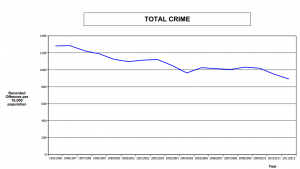Compared to what?
From itnews
A mobility programme using Apple iPhones and iPads has changed the way New Zealand Police officers work, and the force is partly attributing a sharp drop in crime to the rollout of the devices.
According to figures published by NZ Police, using the devices within the Policing Excellence programme [PDF] has contributed to a 13 per cent reduction in crime for the year to May 31.
The Police press release is here, and you can see that they are the source of the claims. But if you look at the linked PDF, the 13% reduction is based on comparing (partly provisional) data for June 2012-May 2013 and June 2008-May 2009. Crime has been decreasing steadily over this time: here’s the graph for 1995-2012 from NZ police (PDF, p16)
The decrease from fiscal year 2008/9 to fiscal year 2011/12 (before the iPads) is from 1031.9 per 10,000 population to 891.9 per 10,000 population, or just over 14% — slightly larger than the decrease claimed when the iPad revolution is included.
It’s not surprising that the new mobility initiative isn’t showing up clearly in crime figures yet — the devices are still being rolled out. In fact the NZ Police report is talking about their whole modernisation initiative (started in August 2010) , though it’s still not possible to say how much of the 13% decrease is due to the changes, and the overall downward trend in crime would be sufficient to explain the entire decrease.
Thomas Lumley (@tslumley) is Professor of Biostatistics at the University of Auckland. His research interests include semiparametric models, survey sampling, statistical computing, foundations of statistics, and whatever methodological problems his medical collaborators come up with. He also blogs at Biased and Inefficient See all posts by Thomas Lumley »

Those are good points, and to add to the picture or story rather, this year’s large-scale rollout which was announced in February was preceded by an 11-month trial the year before.
The Policing Excellence initiative started with a review in 2009 which produced the Fit for the Future document in September that year (http://www.nzherald.co.nz/nz/news/article.cfm?c_id=1&objectid=10596092)
From the story:
“Police officers would become prosecutor and judge, dispensing on-the-spot punishments for minor crimes under plans to turn patrol cars into “mobile stations”.”
Although that sounds more like Judge Dredd than the NZ Police, it’s clear that mobility wa part of the Policing Excellence plan which cabinet approved in 2010 from the start.
Would be good if there was independent research into just how effective such mobility is.
12 years ago
It would have been possible to structure the initial trial and rollout to get reliable information about effectiveness (randomise who participated in the trial period and the order of the rollout).
12 years ago
But the true test is not in a statistical analysis of the results but in the positive impact our change programme has had on communities throughout New Zealand through the great work of our frontline and support staff.
Peter Marshall MNZM
Commissioner of Police
http://www.police.govt.nz/sites/default/files/about-us/policing-excellence-overview-to-30-june-2013.pdf
12 years ago
I think the only possible response here would be to quote the unforgettable Mandy Rice-Davies.
12 years ago